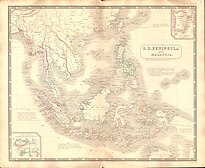1986 Sabah riots
| History of Malaysia |
|---|
 |
|
|
The 1986 Sabah riots, also known as The Silent Riot,[1] occurred between March and May in various locations around the state of Sabah, Malaysia. The riots centred mainly in the capital Kota Kinabalu, as well as in the towns of Tawau and Sandakan. On 12 March, seven plastic explosives were detonated in Kota Kinabalu. A bomb was also detonated in Tawau. At least five bombs exploded in Sandakan killing one newspaper vendor and injuring a senior Police Field Force officer. The riots resulted in the death of 5 people.[2]
History[edit]
The riots occurred in response to the results of the 1985 state election, whereby the newly formed Parti Bersatu Sabah (United Sabah Party) won, ousting Parti Berjaya from the helm of government. Berjaya was the previous ruling party and a component party of Barisan Nasional (BN), the nation's and federal ruling coalition party. It was reported that mobs took to the streets to bring down the president of PBS Pairin Kitingan from the Chief Minister post.[3]
It was also suspected that the riots were triggered by the losing parties including BN to bring forth a proclamation of emergency to justify a takeover by the federal government[4] similar to those which happened in 1966 in Sarawak and 1977 in Kelantan.[5]
Pairin, himself a former member of Party Berjaya, formed PBS barely 47 days before the elections.[6] Opponents of PBS, namely, Harris Salleh of Berjaya, and Tun Mustapha of USNO were dissatisfied with the result. Tun Mustapha then sought to get sworn in as Chief Minister illegally,[7] and this resulted in a court battle which ended in favour of Pairin.[8][9]
PBS later sought to have snap election because of political manoeuvring causing PBS representatives to defect.[10] Malaysian Prime Minister Mahathir Mohamed also tried to negotiate with PBS to form a coalition with BN in return for peace in the state.[4] Finally the election was held on 4 and 5 May 1986. PBS won again and this time with a bigger margin.[11]
Legacy[edit]
A documentary on the 1986 riots was created by Sabahan film-maker Nadira Ilana released in 2012 called The Silent Riot. The film emerged as one of the winning proposals for the Freedom Film Fest (FFF) 2012.[1]
Further reading[edit]
- Gan Pei Ling. The hushed riot of Sabah in Selangor Times
References[edit]
- Chronicle of Malaysia, Editions Didier Millet (2007). "1986".
- ^ a b Amy Dangin (25 October 2012). "Screening of film on 1986 Sabah riot Oct 27". The Borneo Post. Retrieved 5 December 2012.
- ^ Kalimullah Hassan (18 November 2007). "OPINION: Reforms yes, but not through violence in the streets". New Straits Times. Archived from the original on 21 December 2007. Retrieved 18 January 2008.
- ^ Barbara Crossette (1 October 1987). "Kota Kinabalu Journal; With Houses on Stilts and Hopes in Another Land". The New York Times. Retrieved 18 January 2007.
- ^ a b "Malaysian Rules an Election Is Needed in Embattled State". The New York Times. 29 March 1986. Retrieved 8 March 2009.
- ^ Alan Ting (5 February 2009). "Nizar Not First To Refuse To Quit". Bernama. Archived from the original on 8 February 2009. Retrieved 8 March 2009.
- ^ K. Ramanathan Kalimuthu (1986). "The Sabah State Elections of April 1985". Asian Survey. 26 (7). Asian Survey, Vol. 26, No. 7: 815–837. doi:10.2307/2644213. JSTOR 2644213.
- ^ Kalimullah Hassan (18 November 2007). "OPINION: Reforms yes, but not through violence in the streets". New Straits Times. Archived from the original on 21 December 2007. Retrieved 18 January 2008.
- ^ Crossette, Barbara (1 October 1987). "Kota Kinabalu Journal; With Houses on Stilts and Hopes in Another Land". The New York Times. Retrieved 18 January 2007.
- ^ "Historical Background". Parti Bersatu Sabah. Archived from the original on 15 April 2013. Retrieved 18 January 2008.
- ^ Suhaini Aznam (22 June 2008). "Is snap polls the answer?". The Star. Archived from the original on 6 September 2009. Retrieved 8 March 2009.
- ^ "Malaysia – Pilihan Raya – Pilihan Raya Umum Sabah (1986)". GeoCities. Archived from the original on 3 October 2009. Retrieved 8 March 2009.

